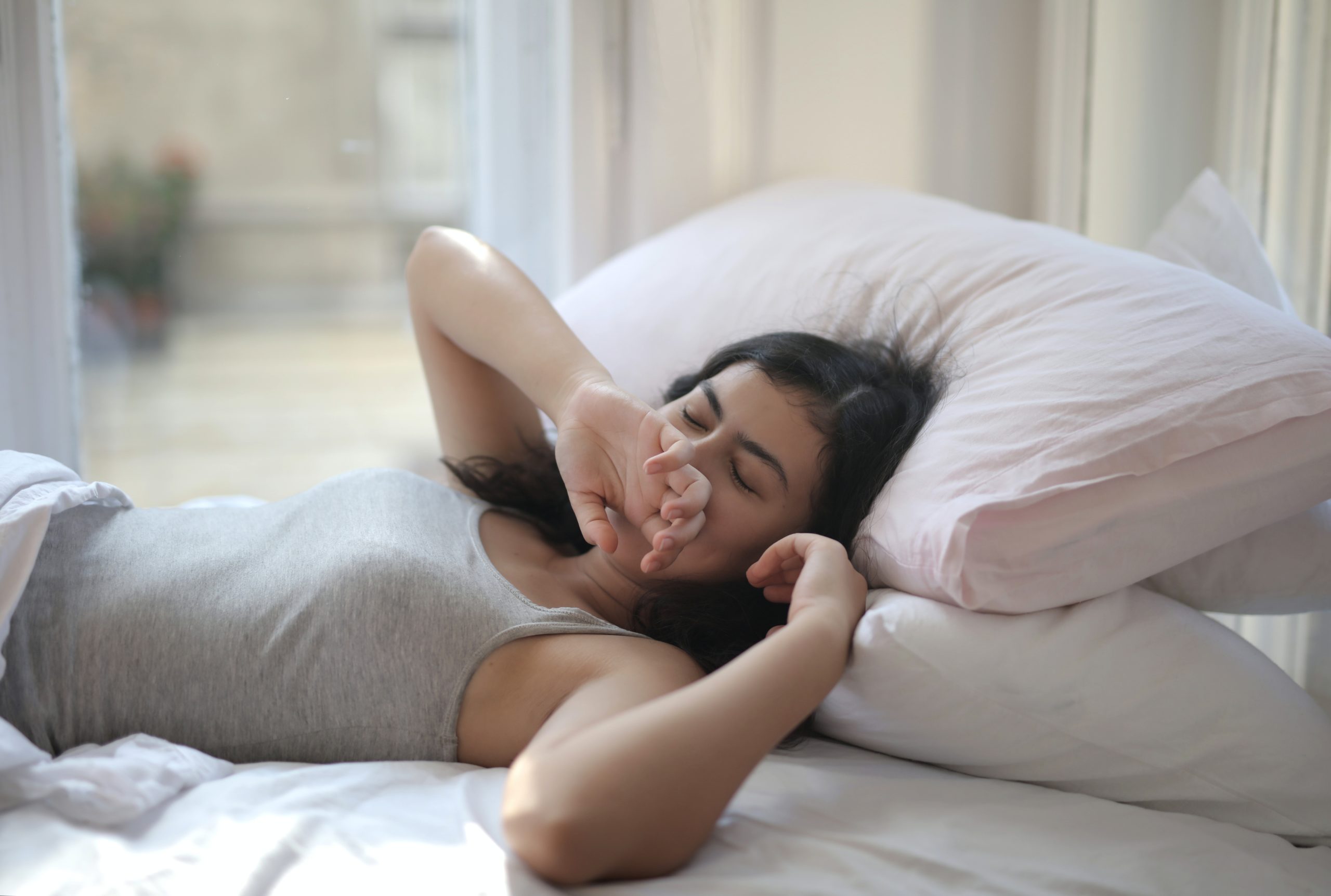Depending on where you are in the world, you may have just experienced the beginning or end of daylight saving time (DST) – a period of disruption to our sleep schedules as we adjust to the time changes! As sleep scientist Matt Walker says, this 1 hour time change is enough to positively or negatively impact your body. For example, during Spring (when we lose 1 hour of sleep due to DST), there is a 24% increase in heart attacks, strokes and car accidents. However, in Autumn (when we gain one hour of sleep), there is a 21% reduction!
As such, this month we’re promoting ways you can reset your sleep schedule to help you get back into a good rhythm! Even if you’re not in a location that has daylight saving time, April is a great month to get on top of your sleep – we still have 8 months of the year left, so why not level up your wellness by improving your sleep?
Here are some of our favourite tricks to help you optimise your daytime habits for better sleep.
1. Get 30-45 minutes of sunlight first thing in the morning
This will signal to your brain it’s time to wake up, making it easier to get up and not feel so exhausted! It will also set your internal body clock for the day, where if you’re getting sunlight at an earlier time than you usually would, it brings your internal body clock forward. This helps you feel sleepy earlier in the evening (and hopefully go to bed earlier too), ultimately promoting you to naturally wake up earlier with ease in the long-term! This tip may be especially useful for those with an evening chronotype who struggle to wake up and feel energised in the mornings. Take our Personalised Wellness Test to find out if you’re an evening or morning person!
Some things to think about:
- It must be direct sunlight into your eyes, so do it in the morning when UV risk is low
- It’s ok if it’s overcast, it will still work
- Practice doing it every day at the same time for long term success!
Try:
Going for a morning walk, eating your breakfast outside, opening the windows while you get ready for work or school, and/or moving your workout to the outdoors.
2. Fit in 30 minutes of movement during the day (at least 1-2 hours before bedtime)
Exercise improves sleep quality by tiring the body, increasing your need to go to sleep and helping you fall asleep faster. Exercise also improves your mental health and wellbeing, helping those with stress and anxiety to fall asleep faster. However, just consider the timing of exercise, which can increase your body temperature and heart rate, possibly disturbing your sleep if done too close to bedtime.
Tip:
The best time to engage in exercise may depend on your chronotype. Here, for enhanced exercise performance, morning types may find it more beneficial to work out in the mornings, while evening types in the evening!
3. Watch your caffeine intake
Adenosine, a chemical produced in the brain that makes us feel sleepy, builds up during our waking hours making us sleepier as the day goes by; ultimately prompting us to fall asleep at night. However, when we consume caffeine, it blocks the receptors of adenosine, reducing adenosine’s ability to act, making us alert. Consequently, caffeine interferes with our sleep-wake cycle, delaying the onset of sleep if consumed too close to bedtime.
Did you know..
Everyone’s ability to process caffeine is different due to their genes! Specifically, the ADORA2A gene, which controls how caffeine is received in the brain. This explains why we all have that friend who can drink coffee right up until bedtime! Our Personalised Wellness Kit can reveal your ability to process caffeine based on your DNA, helping you to time when your last coffee should be.
4. Avoid drinking alcohol before bed
Alcohol helps induce sleep by increasing the production of adenosine. However, this chemical soon subsides causing more sleep disruptions and shorter sleep duration, ultimately compromising overall sleep quality. These negative effects are seen from light to heavy alcohol consumption, so reconsider that second weeknight drink!
Tip:
This doesn’t mean you have to cut out alcohol completely, try the following tips:
Enjoy alcohol as you’re eating a meal, ideally 3 hours before bedtime
Drink water to stay hydrated and flush out the alcohol
5. Order a Personalised Wellness Kit
Did you know our Personalised Wellness Kit can reveal your unique sleep needs? Learn about:
- Morning vs Evening Type
- Sleep Fragmentation
- Sleep Deprivation
- Sleep & Healthy Blood Sugar Levels
- Sleep & Weight Management
- Movement in Sleep
- Sleep Duration
- Social Jetlag
Plus, based on these DNA insights, we’ll recommend you personalised tips and recommendations for your sleep – helping you turn insight into action! Good sleep is transformative. To feel great, perform at your best and achieve your goals, unlock your DNA with our Personalised Wellness Kit!
myDNA, health and wellness your way!
References:
https://www.ted.com/talks/matt_walker_sleep_is_your_superpower?language=en

